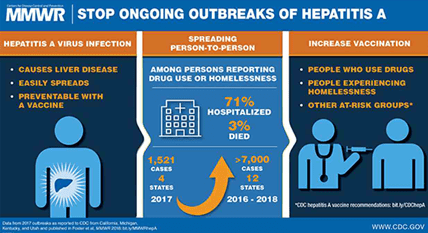According to the most up-to-date info available to Stillman and Friedland, over 2,200 Tennesseans have contracted the hepatitis A virus (HAV) and more are at risk of becoming ill. The current toll of those who have died from the disease is 13 individuals. What can you do to keep yourself and your family healthy and safe?
Basic Facts
Let’s start with the basic facts. Many of you have heard of several types of hepatitis—A, B and C, and there are two more strains, D and E as well. The term hepatitis simply means “liver infection”. Various disease-causing viruses may attack the liver, so labeling them simply identifies the specific strain of the virus. Knowing which strain of virus is responsible means doctors can choose the most appropriate treatment. Symptoms and especially blood tests confirm the diagnosis.
Who Is At Risk?
Who is at risk? The Centers for Disease Control (CDC) identifies these risk groups:
- travelers and visitors going to and from areas where HAV is endemic
- drug users–both injection and non-injection
- men who have sex with men
- people with chronic liver disease and clotting-factor disorders
- people who work with nonhuman primates
- people who anticipate close personal contact with an international adoptee.
- homelessness was approved as an indication for hepatitis A vaccination
How Can You Become Exposed?
How else can you become exposed? Eating food that has been handled by someone with HAV is one way the disease is spread. Improper hygiene spreads the disease when fecal matter is transferred to food when infected food workers do not clean their hands. This means not washing hands properly after using toilet facilities. In the summer, cold foods which are handled by infected food workers present a greater risk. In winter months when more hot foods are consumed, this risk is somewhat reduced.
How can you protect yourself and your family? If there has been an outbreak in your community, or your lifestyle or job puts you at risk, ask your doctor if he or she recommends vaccination. The vaccination consists of a two-part vaccine, with the second injection given six months after the first injection.
Prevention Of Hepatitis A
If you are concerned about simple prevention:
- Avoid eating in places where hygiene is questionable
- Wash your hands thoroughly and use anti-bacterial gel if you are on the go.
- If you have small children, keep their fingernails short so they don’t collect dirt and germs—this is a good general practice and prevents other disease exposures as well.
- You may want to consider more home cooking, and less eating out. If you like the convenience of bagged and washed produce, beware that you need to handle it properly to avoid E. coli exposure.
The Symptoms of Hepatitis A
Worried about a possible exposure? Here is what to look for and where to get answers.
According to the CDC, symptoms can appear anywhere from 15-50 days after exposure. If you have been infected you can spread the disease even before you are symptomatic. A long period before symptoms appear and being contagious before having symptoms make it hard to trace the origin of infection. Unlike with food poisoning, it may take weeks for authorities to narrow down possible exposure sites.
Generally, symptoms occur four weeks (28 days) after exposure.
Symptoms are:
- abrupt onset of fever
- feeling ill or weak
- loss of appetite
- nausea
- abdominal discomfort
- within a few days jaundice (yellowing of the skin and eyes) sets in
If you or a family member has these symptoms, your family physician may refer you to a hospital which is equipped to handle infectious disease and has procedures in place to avoid spreading contamination. The patient and family members may be tested or given an immune globulin (IG) injection. The IG injection is only effective up to two weeks after initial exposure to the HAV virus. Careful hygiene is important when the patient recuperates at home and is still contagious.
If you to know more, check out the CDC website for reliable information on this and many other topics. A qualified medical professional is your best resource for referral to appropriate care.
Wishing our clients and all Tennesseans a healthy end of summer!
Because we care…







